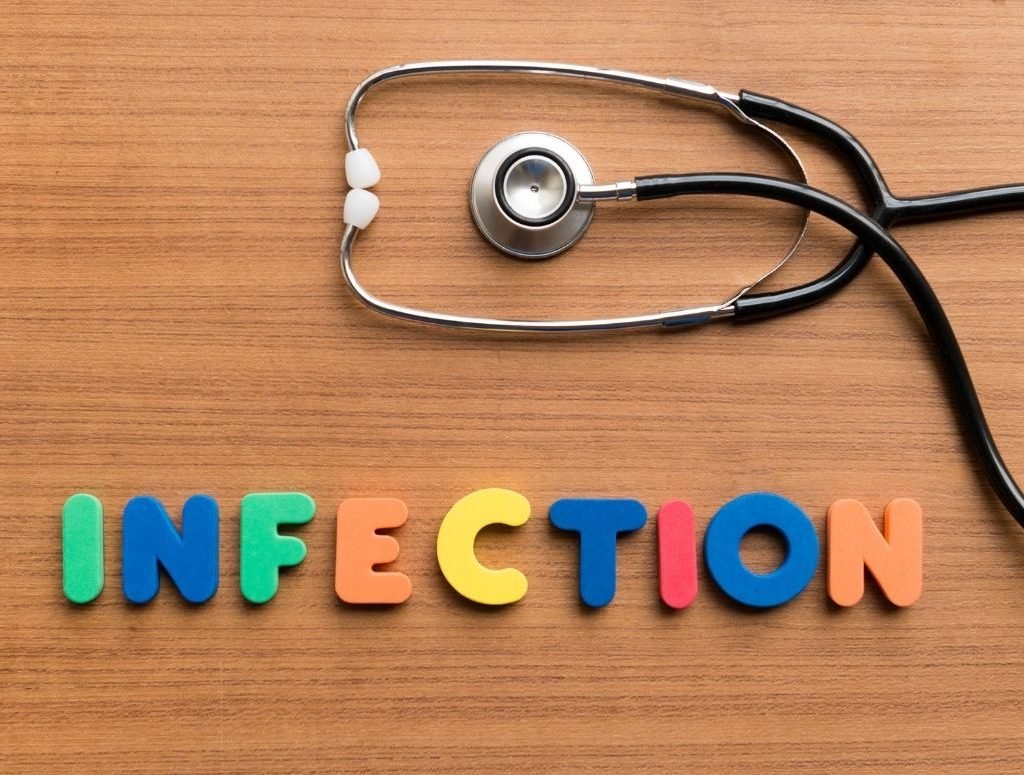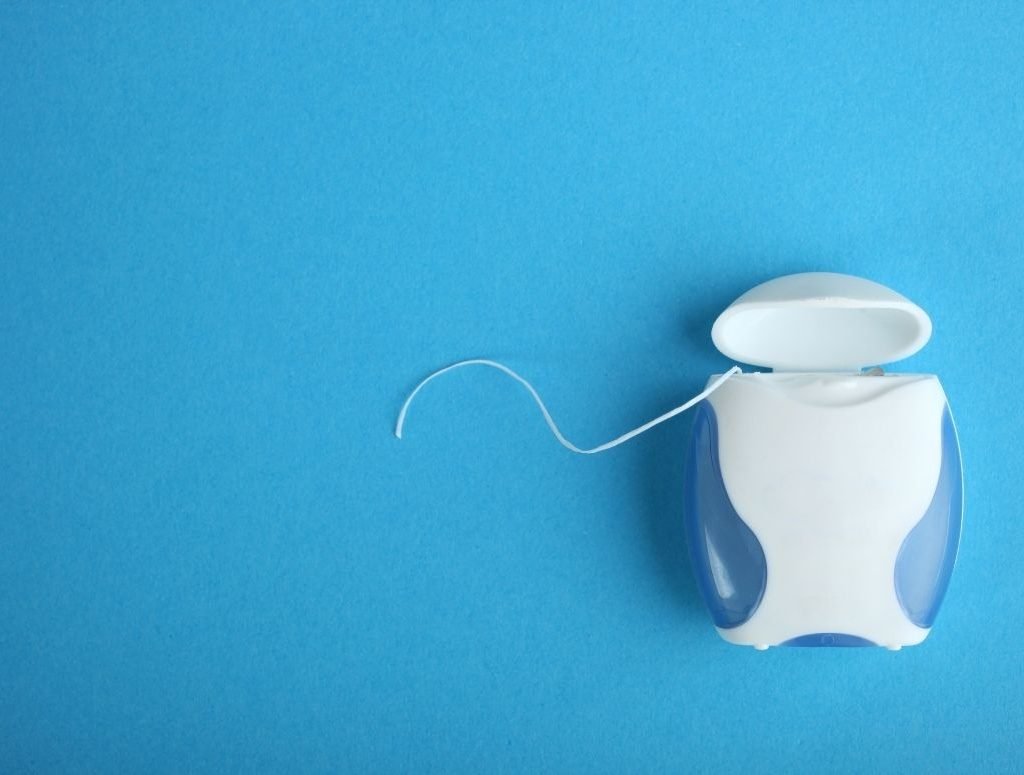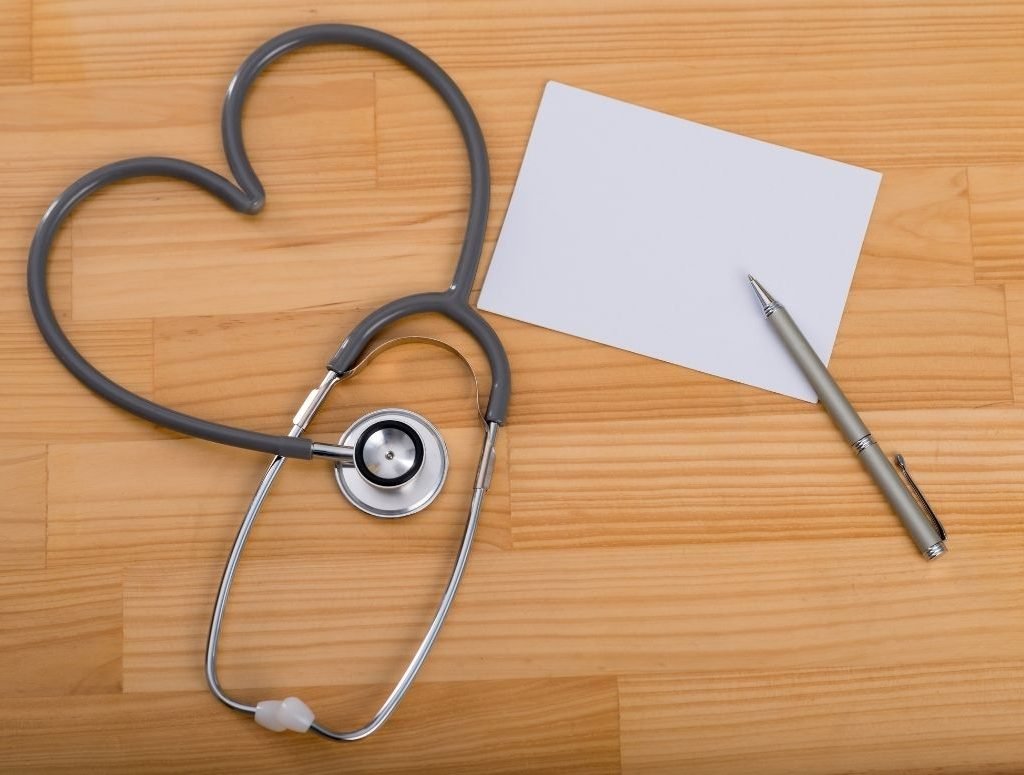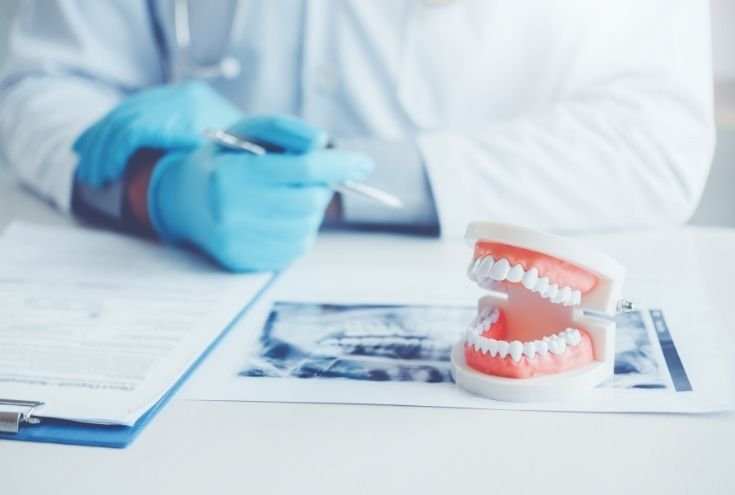Causes, Symptoms, Treatment, & Prevention: Avoid Serious Consequences Today With Ten Solutions
Like most people, you care about your oral health. And, it can be jarring, but the answer to “can gum disease kill you?” is YES, if left untreated.
Gum disease can end up in significantly severe cases that seriously damage your heart and shorten your life.
It may sound like an exaggeration, but bacterial gum disease like gingivitis leads to periodontitis. Periodontitis, on the other hand, can lead to life-threatening endocarditis.
Aside from giving you bad breath, gum recession, sensitive teeth, and bad taste, it can turn your life around in a way you wouldn’t like.

Endocarditis is a deadly inflammation or swelling of the lining of your heart caused by infection.
This disease is commonly caused by a bacterial, fungal, or germ infection spreading to the bloodstream from a part of your body like the mouth.
The bacteria can come from other parts of your body, but the mouth is one of the most common origins.
The germs attach to several damaged areas in the heart and, if left untreated, will destroy the valves and cause death.
While things can be scary, there are excellent habits that you can adopt to keep your teeth, gums, and life safe from such a predicament.
Here Are Ten Excellent Habits You Need to Adopt to Avoid Serious Gum Disease.

Here are ten excellent tips that might just save you from getting gum disease and facing serious, fatal consequences.
- Do not smoke.
- Visit the dentist regularly for cleanings and check-ups.
- Be honest with your dentist.
- Brush your teeth the right way.
- Use an antiseptic mouthwash.
- Floss and use an interdental cleaner.
- Always look out for symptoms.
- Find out if you are vulnerable.
- Get treatment as soon as possible.
- Pursue a healthy lifestyle.
Do not smoke.
Smoking has plenty of adverse effects on your body, teeth and mouth included. It not only stains teeth but is a major cause of gum disease.
Smoking dries your mouth, making you more vulnerable to oral problems. Often, smokers end up with weakened gums, losing their teeth.

It, Directly and Indirectly, Affects your Oral Health.
Smoking irritates your gum tissue and weakens it, allowing germs and bacteria to enter and grow between the teeth and gums.
The vice makes your immune system weak, making it harder for you to fight off gum infections. When you get gum disease, smoking will make it harder for your gums to restore and heal.
When It Comes to Endocardits, Smoking Gives You A Triple-Punch Combo.
First of all, it directly irritates and damages oral tissue, making your gums highly susceptible to bacterial habitation.
At the same time, it directly damages your heart by making it work harder – increasing your heart rate, tightening arteries, and causing irregular beating. This situation makes you weak against bacterial infection.
Finally, with its maiming of the immune system, fighting off bacteria spreading in your heart linings will be an almost impossible battle to win.
Besides, smoking is not just bad for your oral and cardiovascular health, it also affects the lungs and raises your risk of getting cancer.

Stop Smoking!
If you are a smoker, you should try to stop. Not only will you save your teeth, heart and immune system, but you will also avoid nasty, bad breath.
If you are having a hard time quitting, you should consult a general practitioner who can guide you.
If you are not a smoker, please avoid learning the vice. It will cause plenty of harm to your health and life, and you also risk the people around you to secondary smoke.
When you avoid smoking, you can live longer, healthier, and smile better.
Visit the dentist regularly for cleanings and check-ups.

To avoid gum disease, you have to practise healthy oral care habits, and part of it is to go to your dentist at least twice a year, once every six months.
By doing so, you are getting help from an expert in oral hygiene instruction and care who will give you a complete dental health status check and give you all the preventive tools, knowledge and procedures you need.
Prevention is better than cure.
Some people neglect to go to the dentist regularly, thinking that they don’t need to because they don’t feel like anything is wrong with their teeth and gums. However, they ignore the fact that bacteria and germs can gradually multiply undetected.
90% of adults in the UK suffer from some degree of gum disease, and 75% of tooth loss results from it. Yet, most people are unable to avoid it because they don't visit the dentist.
Without a dentist and hygienist professionally monitoring and cleaning your teeth with the right tools, a regular person simply cannot assume that he or she is safe from the possibility of gum disease.
Remember that the longer you leave it untreated, the worse it gets.
Only time will tell until the gaps between your gums and teeth become rich pockets of bacteria that will one day circulate around your body and go to your heart.
You Can Only Detect Gum Disease With A Dentist

Regular Check-ups Will Save You Money.
If you go to the dentist regularly, you will avoid problems that require expensive treatments.
Gum disease will often result in losing teeth, requiring you to have a general dentist or specialist restore the gums before getting implants or dentures. That’s a lot to pay in comparison to twice a year of preventive check-ups and cleanings.
Restoring the gums is a long process and, depending on the severity of the disease, it can cost a lot of money. Implants and dentures can also come at high premiums, especially if you have already lost many teeth.

Just go to a dentist.
The easiest and cheapest solution to gum disease is preventing it by adopting healthy oral care habits and regularly visiting your dentist.
When picking a dentist, make sure you are going to a reliable clinic that promises quality service. Insufficient dental care services give you the risk of having worse dental problems than you already have.
Only go to a place that is well-recommended and trusted by many.
Quality service will give you good, sustainable oral health, and you won’t need treatments in the future as you are able to avoid problems in the first place.
Be honest with your dentist.

Some people won’t come to the dentist, thinking they will be judged by them and while some dentists may be judgy, not all of them are. It’s all a matter of asking a dentist’s patients about him or her.
The textbook models of a good dentist are our practitioners at Holford Curaden. Our staff, hygienists, and dentists are customer service oriented and are always looking forward to help you, not scold you.
When you find your dentist, be honest.
Your Dentist Will Not Shame You.

Gum disease is a result of bad habits, and we are sometimes ashamed to admit them to ourselves, let alone someone else. Whether it is drinking, smoking, or harmful oral care, most will feel ashamed to talk about their problem.
Do not worry. You can talk to your dentist.
Your dentist is a healthcare provider and will recommend steps for you to comfortably but effectively get out of the habits that contribute to gum disease and tooth loss.
Help yourself and be willing to be helped.
Your dentist cannot help you entirely if you do not disclose everything you do that affects your teeth and gums.
If you are to avoid gum disease and its probable serious and fatal consequences, you have to cooperate fully.
Brush your teeth the right way.

Brushing is your first defence against the buildup of plaque around your teeth. Plaque is a thin film of bacteria that produces acids that can destroy the enamel, cause cavities, and lead to gingivitis.
Gingivitis can become periodontitis that can trigger a severe case of endocarditis. If you are to mitigate bacterial infection in your arteries by germs from your mouth, you should clean it.
Gum disease can start the moment you stop brushing your teeth. If you want to avoid it and its potential severe and fatal complications, you have to brush your teeth properly.
You might be brushing your teeth incorrectly.

Prepare to learn the right way.
First of all, you should know something that most people get wrong.
Do you rinse your mouth with water after brushing? If yes, you’ll need to change that habit.
Do not rinse after brushing. You want the toothpaste and fluoride to stay in your mouth for as long as possible.
When you rinse, you have rendered a significant purpose of your toothpaste useless.
Here are some essential tips.
- It would be best if you brushed your teeth twice a day using a manual or electric toothbrush.
- Your toothbrush's size and shape should fit your mouth for you to reach all areas of your mouth easily.
- Remember to get a new toothbrush every three or four months or when your brush's bristles are already frayed.
If you use a worn-out toothbrush, you won’t be cleaning your teeth properly.
- Use fluoride toothpaste.
- More importantly, go to the dentist for advice on the best brushing products he or she recommends for you.
When should you brush?
The ideal schedule for your first brush of the day is right when you wake up before you have any meal. Wait for at least thirty minutes before eating or drinking water after brushing.
After a meal, your mouth would have come in contact with acids that can soften the enamel and irritate your teeth and gums. When you brush right after eating, you are somewhat brushing the acids into your teeth and gums which will cause more harm than good.
However, many people will refuse to switch from brushing first before eating as no one likes their food to taste like toothpaste. Some people would even avoid eating chocolate mint sweets or snacks because they feel like they’re eating toothpaste.

If you didn’t bring yourself to change this habit, the solution would be gargling very well with water or mouthwash before brushing.
Mid-day brushing is unnecessary. Mouthwash is enough after meals, and of course, if you feel things stuck on your teeth, you can always floss or use an interdental brush.
Your last brush of the day should be right before you go to bed when you have no more meals. This way, the fluoride can remain on your teeth for the duration of the night.
It would be ideal to floss before your last brush of the day.
Brushing is an easy habit that is vital for mitigating severe, life-threatening gum disease.
It would be best if you brushed your teeth for a minimum of two minutes. Within that duration, here are the things you would have to do.
- It would be best if you placed your toothbrush at a 45-degree angle to the gums.
- Move the brush gently in a circular motion, cleaning all of your teeth.
- Gently brush the outer, inner, and chewing surfaces of your teeth.
- Clean the inside surface of your frontal teeth by tilting the brush vertically and again making circular motions.
- Don’t forget to brush your tongue.
Use an antiseptic mouthwash.

Before anything else, you should never forget that mouthwash is not an alternative to brushing your teeth.
Gargling with mouthwash is not a shortcut to clean teeth.
Please do not go on with your life using only mouthwash for your oral hygiene – you will be endangering yourself if you don’t brush your teeth.
Use mouthwash to supplement the benefits of brushing.
You should use it before you brush when you wake up and when you floss and brush before you sleep.
It would be ideal to gargle mouthwash before using interdental brushes after meals.

Why use antiseptic mouthwash?
Antiseptic mouthwash is a bacteria killer. It uses antiseptic substances like alcohol, menthol, and eucalyptol as an active ingredient.
The mouthwash gets into the crevices between every tooth. It can access hard-to-reach places, including the very back of your mouth where filmy bacteria usually collect.
It is an ideal type of mouthwash for killing bacteria and gum and tooth protection.
An antiseptic mouthwash will give you great smelling, minty breath. Also, it will help prevent infection and gum disease by stopping the buildup of plaque around the teeth.
Antiseptic mouthwash loosens up hidden food particles, making them easier for you to get rid of during brushing & flossing.
Remember that mouthwash is a supplementary oral hygiene tool to toothbrushing, not an alternative.
Floss and use an interdental brush.

Brushing does a great deal when it comes to preventing gum disease. However, to be thorough, you will need to use interdental brushes to clean in between your teeth.
It would be best if you floss at least once a day, preferably before you go to bed.
Some people who haven’t flossed for a while will become hesitant to do so. People who don’t regularly floss will experience bleeding gums when they do it again for the first time in a long time.
If you are experiencing this, do not worry. Give it one to two weeks of regular flossing, and your gums will become used to it again. Just make sure you’re not flossing too hard.
To make flossing more manageable, it would be best if you gargled mouthwash before doing so. You can also gargle with mouthwash after flossing to flush out anything that might be lingering in your mouth.

Supplement your flossing with an interdental brush.
Whether you do one or the other first shouldn’t matter, but you must use an interdental brush at least once a day too.
Some dentists will recommend an interdental brush as an alternative to flossing. Like the good old floss, an interdental brush is a cleaning tool used to reach places that your regular toothbrush cannot.
Your dentist will give you personalised instructions and recommendations about what you should be utilising for oral hygiene.
Whichever way you do it, using an interdental brush as part of your daily oral care routine is excellent for keeping your gums safe from disease.
An excellent oral care routine will allow you to prevent gum inflammation, bacterial or germ infestation, cavities, and bad breath.
Always look out for symptoms.

Some people don’t know that they have gum disease. It is a slow disease that could be going on for years undetected.
It is a slow killer.
Not only can you lose your teeth, but the bacteria in your mouth might end up spreading in your arteries and compromising your cardiovascular health.
Some people lose their teeth as early as 30 years old because of undetected or neglected gum disease.
It is the most significant cause for losing teeth, and if you have it, it can also be why you lose your life.
How do I know if I have gum disease?
- Are people offering you gum?
This sign might sound too simple, but people constantly offering you gum could be a sign of bad breath – a telltale result of bacteria in your gums.
Gum disease bad breath is distinctively unpleasant, and you could be speaking to family, friends, coworkers, or clients not knowing anything is wrong.
- Do you have receding gums?
Gum disease causes recession or receding gums that can eventually cause loss of bone in your teeth.
When gum recession happens, you will appear to have long teeth or horse teeth. You will also become more vulnerable to tartar and plaque collection.
- Does your mouth taste bad?
A bad taste in your mouth can mean bacterial or germ collection. It has often been compared to the taste of metal. You might have tartar and plaque that comes with gum disease.
This predicament is one of the worst discomforts you can have, unable to enjoy your food’s natural taste.

- Do you have sensitive teeth?
Gum disease contributes to a receding gum line, exposing roots. This exposure results in discomfort when eating and brushing.
- Are you experiencing bleeding when you brush?
Bleeding gums can mean that you already have some gum damage, or it could be inflammation caused by tartar and plaque.
All these possible implications can mean gum disease, and you should never ignore bleeding. Plan a visit to the dentist at the first instance.
While it is better if you never have to experience these telltale signs of gum disease by prevention, you shouldn’t be afraid to approach a dentist for help when you have the symptoms.
If you think you have gum disease, book an appointment with us asap so that you can avoid complications.
We are here to help you avoid complications.
How do you know if you have endocarditis?
Here are the common signs and symptoms of endocarditis.
- Joint and muscle pain
- Pain when breathing (in the chest)
- Shortness of breath
- Fatigue
- Flu-like symptoms, including fever and chills
- Night sweats
- Swollen feet, legs or abdomen
- A new heart murmur (the sound made by blood rushing through the heart)

Here are the less common signs and symptoms of endocarditis.
- Unexplained weight loss
- Blood in the urine (sometimes you won't see it, but the doctor can detect via microscope)
- Tenderness in the spleen (an anti-infection organ located below the left rib cage)
- Janeway lesions or red spots on soles of the feet or palms of the hands
- Osler's nodes which are red and tender spots under the skin of the fingers or toes
- Petechiae or tiny purple-red spots, on the skin, in the whites of the eyes or inside the mouth
If, after reading these symptoms, you feel like you might have it, please call your doctor immediately. Especially watch out if your joint pains, fevers, chills, headaches, and shortness of breath are frequent or getting worse.
Your doctor will have you go through diagnosis and tests to pinpoint your situation.

- You might have to get a blood culture test to identify germs in your bloodstream. The results will allow your doctor to determine which antibiotic is most appropriate for you.
- A CBC or complete blood count will show if there is an increase in the number of white blood cells, indicating an infection. If the test shows a low number of healthy red blood cells, it could mean that you have endocarditis.
- With an echocardiogram, your doctor will be able to check if your heart and its valves have sustained damages.
With a transthoracic echocardiogram, your doctor will stick a wand-like device in your chest which produces sound waves, creating an image of your heart.
A transesophageal echocardiogram uses a tube with a small transducer attached at the end. The line is inserted through your mouth, down to your stomach, showing a more detailed image of your heart.
- Your doctor might subject you to an ECG or electrocardiogram to measure the consistency and speed of your heartbeat.
- A chest X-ray will allow the doctor to see spreading infection or swelling of the heart.
- With a CT scan (computerised tomography scan) or an MRI (magnetic resonance imaging, your doctor will be able to check whether an infection has spread to other areas of your body, like the brain and chest.
It would be best if you avoided having to go through such a costly health situation by preventing infection in the first place.
Visit your dentist regularly and take care of your oral health.
Find out if you are vulnerable.

Some people are more susceptible to endocarditis. It would be best if you found out if you are one of them to be more careful.
Here are the people susceptible to gum disease-induced endocarditis and endocarditis in general.
- Older Patients
Adults over 60 usually have less effective immune systems and cardiovascular health, making them easy targets for infection.
- Patients with artificial heart valves
Germs and bacteria are more likely to invade an artificial or prosthetic heart valve than a natural one.
- People with damaged heart valves
If you have a medical condition, such as rheumatic fever or infection, it can damage or scar your heart valves. Damage in one or more heart valves increases your risk of disease.
- Patients with a congenital heart defect
People who were born with certain types of heart defects are vulnerable to infection. If you were born with an irregular heart or have abnormal heart valves, you are at a higher risk than regular people.
- Patients with an implanted heart device
Bacteria can easily attach to an implanted device like a pacemaker.
- Previous endocarditis patients
Those who have had the disease before
- People with poor dental health
If you don’t practice excellent oral hygiene and refuse to get checked by a dentist every six months, you are at high risk of having gum disease leading to endocarditis.
For endocarditis that is not induced by gum bacteria, people at risk include those who have a history of using injected illegal drugs. The needles that users use to inject are most probably contaminated with bacteria that can cause the disease.
Also, patients who have been subjected to long term catheter use are susceptible to endocarditis.
Get treatment as soon as possible.

If you already have gum disease, you will need to go through dental treatments to prevent more complications.
Here are some of the dental treatments for people with damaged and infected gums.
- Scaling and polishing
This treatment is done to remove plaque and tartar on the teeth. “Scale and polish” is a “professional clean” commonly done by a dental hygienist.
The hygienist will scrape off the plaque and tartar from your teeth using special cleaning tools. Then, the hygienist will polish your teeth and remove marks or stains.
If you have a lot of plaque or tartar on your teeth, you may be prescribed more scale and polish sessions or be referred to a Specialist Periodontist.
- Root planing
Root planing or debridement may be done for some cases of gum disease.
This treatment entails deep cleaning under the gums to get rid of bacteria from the roots of the teeth.
Before the treatment, a dentist may give you a local anaesthetic or painkillers to numb the area to be treated.
Most clinics will tell you that you might feel discomfort after the local anaesthetic wears off.
If you get treatment at Holford Curaden, the procedure will be pain-free!
For people with severe gum disease, further treatment is needed.
If you have a severe case, you might have to undergo periodontal surgery. Sometimes it would be necessary for the dentist to remove an affected tooth.
Periodontal surgery is a reshaping surgical procedure. The surgery is made to restore and regenerate the standard form and function of damaged periodontal structures supporting the teeth, i.e. gum tissue, ligament, and bone.
Surgical procedures vary from one case to another, and your dentist should be able to tell you about how yours will be carried out. When needed, your dentist will refer you to a specialist.
For both root planing and surgery, there is a possibility that your dentist might prescribe antibiotics to stop the infection.

Acute necrotising ulcerative gingivitis or ANUG is a non-contagious infection of the gums. It is a common gum disease with sudden onset.
It results in the ulceration of the gum sections between adjacent teeth called interdental papillae. It also leaves you with painful, bleeding gums.
To treat ANUG, you will be prescribed to use painkillers, antibiotics, and a specialised mouthwash.
For antibiotics, you could be given metronidazole or amoxicillin for three days. You won’t be given amoxicillin if you are allergic to penicillin.
The possible side effects of these drugs are feeling sick, diarrhoea, and vomiting.
It would be best if you did not drink any alcohol while being treated with metronidazole. The reaction will make you feel very unwell.
For painkillers, you most probably will be given the standard paracetamol and ibuprofen.
For mouthwash, you might be prescribed chlorhexidine or hydrogen peroxide-based products. Some of them may need to be diluted in water, so please read instructions or listen to the advise of your dentist before using them.
What if I have endocarditis?

If you are diagnosed with endocarditis, there are several treatments that you can go through.
Most patients are successfully treated using antibiotics.
When cases get serious, you may need surgery. Surgery can either fix or replace damaged heart valves and altogether remove the infection.
When you are given medication for endocarditis, you may be asked to spend at least a few days in hospital. You will take high doses of IV antibiotics, and your doctor will monitor your treatment.
When your fever and other severe symptoms are gone, that usually is the sign for your doctor to send you home and continue medication.
You might have to take medicine for several weeks until there is no more infection.
For endocarditis caused by fungal infections, you will be given antifungal medication instead. You can also be given antifungal medication for life to avoid relapses.
When needed, you might have to go through heart valve surgery.
Surgical procedures will be done if your infection is persistent or if your valve is already damaged and in need of repair or replacement.
To repair or replace a valve, the doctor will use an artificial valve made of heart tissue from a pig, cow, or human. The surgeon may also use a prosthetic mechanical valve.
Endocarditis is an disease that you can avoid.
Prevention will save you a lot of money.
Visit our clinic, and let’s talk.
Pursue a healthy lifestyle.

The best way to prevent getting gum disease and develop dangerous complications is by keeping yourself healthy and and your teeth clean.
Eat a proper diet that will not increase your chances of getting heart diseases.
Avoid smoking and doing drugs at all costs and drink moderately and occasionally.
Exercise regularly to keep your circulatory system in excellent condition.
Take care of your teeth by brushing properly and using the right supplementary cleaning tools like floss, interdental brushes, and mouthwash.
Most importantly, visit your doctor and dentist regularly.
Visit your dentist regularly.
If you are looking for quality dental services with reasonable prices and top-notch results, look no further.
Holford Curaden houses the best dentists, hygienists, and gum specialists who will take care of your teeth and gums.
We are experts in prevention. However, if you need treatment for gingivitis or periodontitis, we can help and provide you with a pain free experience.
- 1st Floor 73 New Bond Street Mayfair London W1S 1RS
- 020 7499 9806
- smile@holfordcuraden.com
- 1st Floor 73 New Bond Street Mayfair London W1S 1RS
- 020 7499 9806
- smile@holfordcuraden.com





